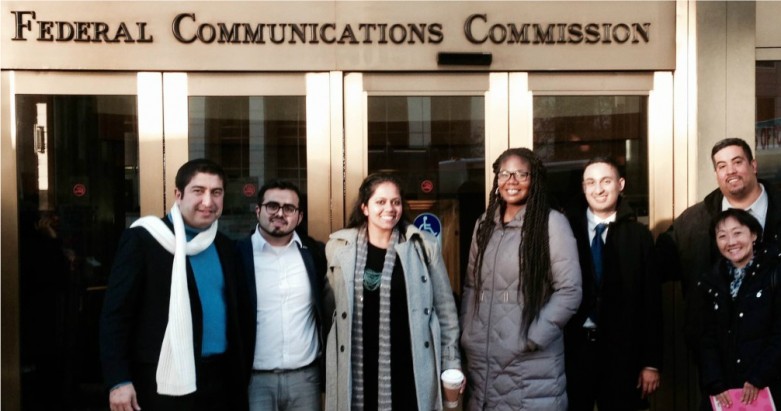
FCC, Deliver the Internet We Deserve
This piece originally appeared on the MAG-Net blog.
Everybody lack confidence, everybody lack confidence
How many times our potential was anonymous?
How many times the city making me promises?
So I promise this.
On Nov. 20, members of the Media Action Grassroots Network and our allies at ColorOfChange.org, Presente.org and Free Press met with FCC Commissioner Mignon Clyburn to deliver a letter signed by more than 90 racial justice and civil rights organizations.
Endorsers of the letter called on the Federal Communications Commission to implement real Net Neutrality rules by reclassifying broadband as a Title II common-carrier service. Our meeting with Commissioner Clyburn came shortly after President Barack Obama’s bold statement on Net Neutrality. Our letter and President Obama’s statement join a chorus of more than 4 million people who have submitted comments on this issue at the FCC, with the vast majority favoring Net Neutrality and reclassification.
We brought this delegation of civil rights leaders to Washington, D.C., to remind Commissioner Clyburn that the communities that will be most adversely affected by weak Net Neutrality rules are communities of color. Presente shared how vital an open Internet has been in pushing the immigration debate forward and empowering President Obama to issue last week’s executive order. For ColorOfChange, an organization that grew from one email in the aftermath of Hurricane Katrina to the largest online community of African Americans, the Internet has allowed it to stake out a powerful political voice. The evidence of this power is unfolding in Ferguson as we speak.
The delegation also included Free Press and members of the Media Action Grassroots Network, the Center for Social Inclusion and the National Hispanic Media Coalition. We delivered the message that strong Net Neutrality 1) ensures companies are not allowed to discriminate against voices online, 2) bans fast lanes and slow lanes, and 3) provides equal protections for the 60 percent of Latinos and 43 percent of African Americans who access the Internet primarily through their cellphones. We highlighted what a D.C. circuit court made clear — that for the FCC to ban discrimination online, it must reclassify broadband as a Title II telecommunications service. Simply put, the FCC must regulate the Internet like a utility and not like an entertainment platform.
For poor and working-class communities and people of color, the fight for digital rights is one of the most significant civil rights struggles of the 21st century. Many have likened its importance to that of the Voting Rights Act of the 1960s.
Prior to 1965, African Americans had the right to vote, but voting-rights rules were weak and fraught with discriminatory practices (literacy tests, poll taxes), making it virtually impossible for African Americans to register to vote. As a consequence, the agency and ability of Black communities to shape the outcomes of their lives remained limited. White politicians they never voted for created the laws and all-white juries decided their fate in court. The Voting Rights Act was a major milestone in the struggle for civil rights, and set the stage for the growth of political power within communities of color.
We are living in an era in which the voting rights of diverse communities of color are again threatened, and the Internet is emerging as a powerful vehicle for the political voice of these communities and other marginalized groups. To protect the public voice of communities of color, the FCC must pass Net Neutrality rules that protect all Internet users equally, and regulate the Internet like the vital utility that it is.
Please join us in preserving our right to a voice. Let’s continue to pressure the FCC to deliver the Internet we deserve.